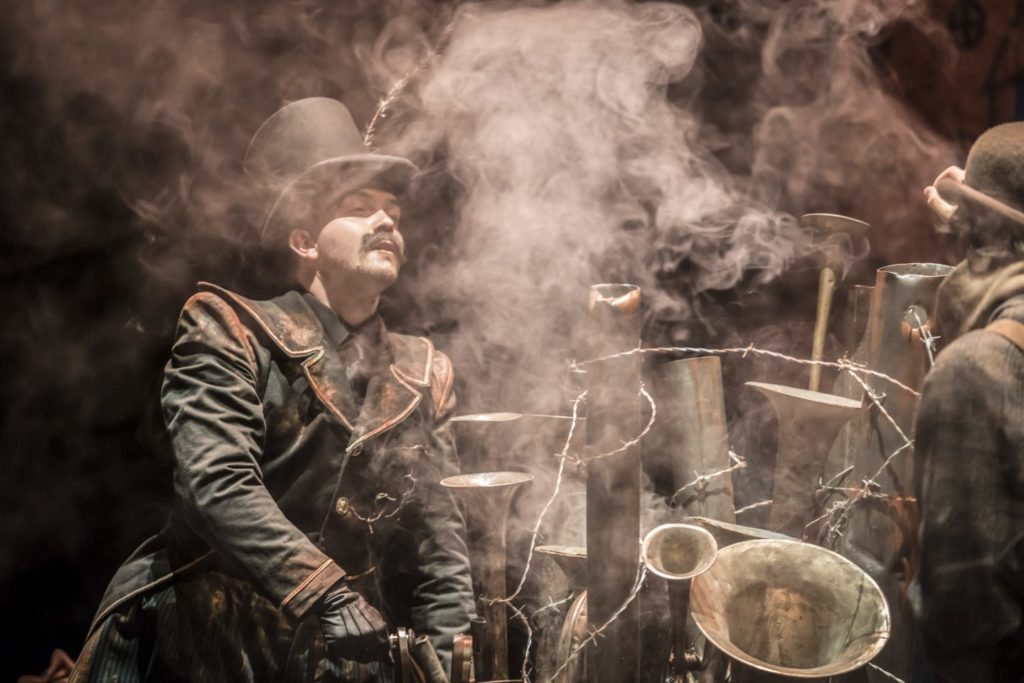Welsh National Opera – Brundibár (The Grouch)
Western Studio, Wales Millennium Centre
Sunday 23rd June 2019
Welsh National Opera has not stopped the past few weeks. Cardiff Singer of the World and their Freedom season have proven to be great successes. Though a brief break back into the Freedom season left us with a little piece to wrap things up: Brundibár.
The impact of this charming children’s opera by Czech composer Hans Kráza is monumental. Were it not for its 50 or so performances in the Theresienstadt concentration camp in 1943 it could have easily faded into obscurity. Works of arts premiering and being performed in the camps are not strange, as some powerful pieces were written by those imprisoned by the Nazis. You only need to look at Olivier Messiaen’s Quartet for the End of Time as an example. Opera had even been handpicked as a driving force of the Third Reich, the now unfortunate (yet controversially brilliant) work of Richard Wagner made front and centre for their evil agendas. Children’s opera would also come into their own in the years following the war, with the likes of Benjamin Britten and his commitment to community lead projects on the Suffolk coast.
Director David Pountney needed to add little to the production, yet it remains one of his finest works for WNO. The setting of it within the concentration camp, is expected due to the weight that comes when considering the history of the piece. This is a rousing account of how the children caught up in mankind darkest hour, fought for freedom through the power of theatre. Yet, most of the children would not see adulthood, as this victory over oppression came at a price. The many accounts of the children who performed in this very opera spoke of how free they felt and how it liberated them from their everyday miseries. Perhaps the best remark comes from survivor Handa Drori, née Pollak: “good will triumph since we stick together”.
It’s a simple story and so it should be. Pepíček and Aninku try to get milk for their sick mother. Whilst away, they come across vendors who wont help them unless they have money. In comes Brundibár, the grouchy, organ grinder who rakes it in with considerable donations. The children try to busk themselves, but are blasted by Brundibár. Aided by woodland critters, the children sleep in a forest and in the morning are given extra support from a group of children who all band together to raise funds for their mother’s milk. Loosing his cliental, Brundibár attempts to steal the children’s contributions, but he is booted out and everyone sings of the victory. Turns out the children who first premiered this compared the organ grinder to Hitler and the vendors who would not help the children, as the S.S. The real dagger in the heart here, was the tonal shift moment after the ‘‘performance’’ when the children marched off stage, followed by the train whistle indicating they were off to the gas chambers.
This was a production which did not shy away from it being set in the Holocaust (or as it should be known: Showa to Hebrew speakers). As we arrived, barbed wire and railings lingered along the gangway. A imposing Nazi like figure adjourned yellow scarfs over our heads, as we went to our seats. Though these yellow markers were used to shame Jews, here we all wore them with pride. The phrase “If six million Jew were killed, then we are all Jews” came to mind. The mass of children were our inspiring Greek chorus, the soloists also sweet and sincere in their delivery. The costumes by Bethany Seddon has a grit and worn quality to them, perfect for this context. Brundibár’s costume felt like a fusion of steam punk and death metal, effective in its theatricality. Even his brassy organ has barbed wire wrapped round it (even his topcoat as well). The Grouch here played by John Ieuan Jones, wonderfully pompous in the title role was great fun anytime he was on stage. Some wonderful playing from a handful of the WNO Orchestra was given, including some lovely music for guitar, piano and accordion.
Kráza’s score has a bit of everything. It’s delightful in its delivery, this being a children opera which should satisfy any age. The luscious lullaby sung to the two children before sleep was a touching moment and seen as a rite of passage, as their responsibilities increase. The translation by Tony Kusher (of Angels in America acclaim) has given a clear, crisp version of the joyful libretto by Adolf Hoffmeister. The rhyming scheme is fluid, from the Czech and the overall dry, sensibility of the words are made special by the excitable score. Video work after the performance went into detail about this history of the piece. The real powerhouse performance here was from conductor Tomáš Hanus. He perhaps knows the story better then any other of his generation, as his own mother was one of the children to sing the opera in the concentration camp. Had the war been drawn out any further, she would have been killed. Yet fate saved her and her son has been truly humbled by the opportunity to conduct this marvellous work. My heartfelt respect goes to this always compelling maestro, who took on the challenge of performing what must have be an emotional avalanche.
A very special performance.
Rating: 5 stars
Welsh National Opera’s Don Pasquale continues on tour til 12th July 2019. WNO’s autumn season is Carmen, Rigoletto and The Cunning Little Vixen.
Related Articles:
http://thesprout.co.uk/blog/review-wno-dead-man-walking-wmc/
http://thesprout.co.uk/blog/review-wno-the-consul-wmc/
http://thesprout.co.uk/blog/review-wno-the-prisoner-fidelio-act-ii-wmc/
Photo Credit: Johan Persson

